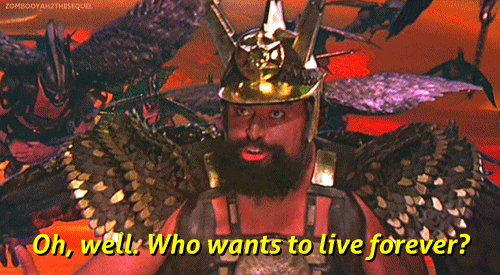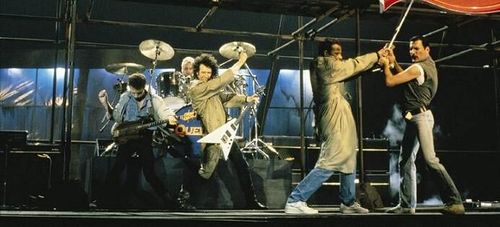Please enjoy this encore post on the wonders of Queen, originally published on April 19, 2016.
No band is more intimately connected with the world of science fiction and fantasy than the legendary Queen. From their prog experiments of the ’70s to their power rock of the ’80s, the band provided the escapist soundtrack to a number of films—some of which would barely be remembered at all were it not for the music. I like to think that there is something deeper at work here, but I’ll settle for saying that Queen had a knack for producing catchy earworms that seemed to fit with almost any movie.
Please bear with me here: much of this article will be spent gushing over my love for Queen, and for the movies that have utilized the band’s iconic sound. You’ve been warned.
I first encountered Queen in 1989, when I was eleven. That spring, MTV gave some airtime to the single “I Want It All,” and I remember thinking that this new band had a bright future ahead. It took another year or so—and, of course, many viewings of Flash Gordon (1980) and Highlander (1986)—to realize that I had in fact been listening to their music for a long time. When lead singer Freddie Mercury died in 1991, it became fashionable for people my age to claim that they had been fans of Queen all along—especially after Guns N’ Roses frontman Axl Rose stated in an interview that A Day at the Races was one of his favorite albums. In early 1992, “Bohemian Rhapsody” enjoyed a renaissance when it was featured in Wayne’s World. Like many kids that year, my classmates and I at St. Bernadette School would impersonate Wayne and Garth banging their heads to the guitar solo. Around that same time, I sat in a basement with some friends and watched the Freddie Mercury tribute concert at Wembley Stadium.
The number of movies and television shows that have borrowed the music of Queen is staggering. Please take a moment to check out the list here… You’ll find Shaun of the Dead, Scott Pilgrim vs. The World, A Knight’s Tale. (You’ll also find The Big Bang Theory in there. I’ll let that go.)
But amidst the endless looping of “We Are the Champions” and “We Will Rock You”, the soundtracks to Flash Gordon and Highlander stand out as a glorious marriage of image, story, and sound. Now, perhaps you’ve heard of these films—most likely from someone repeating a line out of context—but have yet to watch them. Are they great? No. But they are fun, unique, memorable, quotable, and rewatchable—wonderful specimens of a very strange era in cinema. Both films cry out for their own special drinking games—though if you take a shot every time Christopher Lambert messes up his Scottish accent, you’ll land yourself in the emergency room.

Flash tries to straddle the line between the camp of Superman (released two years earlier) and the more adult themes that were becoming commonplace by the early1980s. (I’m still [pleasantly] surprised by how much sex is in it.) The movie features a protagonist so gorgeous that he can hardly be taken seriously, along with an over-the-top villain, a winged Brian Blessed wearing a loincloth, an impromptu football game involving Emperor Ming’s stormtroopers, and a climactic laser battle. It’s impossible to think of the movie without the soundtrack that Queen produced for it, which includes a theme song that you’ll be tempted to shout at random moments for the rest of your life (“Flash! Ah-ahhh!”). The synth score accompanying the football match makes it feel as though you’re watching a friend play an old Nintendo game. Later, the music that drives the epic hawkmen battle is so loud and fast-paced that it sometimes overpowers all the gunfire and explosions. Blessed’s character Vultan orders his hawk squadrons to “DIVE!” in perfect timing with the music, almost as if he is an honorary member of the band. Oh, if only.
While no more plausible, Highlander is nevertheless more serious and gritty, with heavy themes of loss, loneliness, and revenge propping up an otherwise silly story. Here, Queen’s soundtrack once again rises to the occasion, most notably in the song “Who Wants to Live Forever?”, which plays while the immortal Connor MacLeod witnesses the death of his beloved wife.
There’s no chance for us.
It’s all decided for us.
This world has only one sweet moment
set aside for us.
That’s brutal. In contrast, the theme song “Princes of the Universe” showcases the bombast and sheer fun of the film. The video features Freddie Mercury briefly recreating the climactic swordfight with star Christopher Lambert. “Princes” proved so popular that it appeared in the opening credits of the long-running television adaptation.
In addition to these larger productions, the band’s singles often gravitated toward the kooky and the fantastical. Among other songs, “39” tells the story of astronauts who return from a year-long voyage to find that a century has passed since they left. Mercury’s first solo song “Love Kills” was featured in a special soundtrack to Fritz Lang’s Metropolis, and Queen’s surreal video for “Radio Ga Ga” includes clips from the film.
It’s difficult to come up with a unified theory as to why Queen lent itself so well to the genre. I suppose an explanation should start with the band members themselves, most of whom have a background in science. Bassist John Deacon studied electronics, drummer Roger Taylor has a degree in biology, and guitarist Brian May earned a Ph.D. in astrophysics. In 2015, May famously collaborated with NASA on the New Horizons project, which brought back the unprecedented images of Pluto. Fittingly, he has performed in bands and music projects with names like 1984 and Star Fleet.
But the energy, charisma, and defiant weirdness of the group are commonly attributed to Mercury. His biography almost reads like a science fiction story in itself, featuring a supernaturally talented chosen one who rises from obscurity to greatness. Born Farrokh Bulsara in the sultanate of Zanzibar, Mercury spent part of his youth at a boarding school in India. Later, an outbreak of violence in the sultanate forced his family to move to the United Kingdom. Along the way, he learned the piano and the guitar, and drew inspiration not only from rock but from Bollywood, classical music, theater, and opera.
Rather than conform, Mercury embraced an oddball side in a way that should inspire anyone who has ever felt like an outsider. From the cheeky name of the band, to his incorporation of ballet, to his outrageous cosplaying (before that was a thing), Mercury refused to let others define him, or to pigeonhole him as just another singer. This came with a cost, however. British tabloids enjoyed speculating about Mercury’s wild behavior, and the band’s decision to dress in drag for the video “I Want to Break Free” (a parody of the British soap opera Coronation Street) led MTV to ban the track, which undermined a decade’s worth of effort to expand their reach into the United States. From all of this emerged a persistent theme of the power of the individual, which fit perfectly with stories about strangers in a strange land overcoming the odds stacked against them. It is no wonder that this music became an anthem not only for the fantasy worlds of sports and science fiction, but for various political movements of the time as well.

This bravery in the face of conformity would keep the band together through the final act of Freddie Mercury’s life. After years of rumors, the singer privately informed his bandmates that he was in fact dying of AIDS, but that he would continue performing regardless. According to May, Mercury said, essentially, “Let’s get on with it.” Those years produced some of the most touching and stubbornly optimistic songs, including “The Miracle” and “Innuendo.” At the same time, the videos put Mercury’s physical decline on full display. After all the costumes and energetic performances, his diminished appearance in “These Are the Days of Our Lives” is particularly jarring. Shot in black and white, and caked in makeup, a gaunt Mercury nevertheless looks into the camera, smiles, and sings the phrase, “I still love you”—a cheerful middle finger at the hand he had been dealt, reminiscent of Johnny Cash’s performance in the video for “Hurt.”
We are approaching a quarter century without Freddie Mercury, and I can’t keep from speculating about what quirky, over-the-top fantasy movies could have used an original Queen track. I’m looking at you, Batman Forever. Perhaps a Queen song would have made that film more watchable. Same with you, Demolition Man, Face/Off, and The Fifth Element.
It hurts to speculate about what could have been. But I suppose there is some consolation in knowing that Queen remains so beloved, and so intertwined with the world of science fiction and fantasy. This blockbuster season, I counted at least two trailers that used their music (Suicide Squad and Hardcore Henry). If I were a betting man, I would put my money on Guardians of the Galaxy Vol. 2 sneaking in a B-side track. More importantly, so much of the social baggage that prevented people from appreciating Queen decades ago is at last falling away. And, for all the problems that remain, I think the SFF genre is telling better stories than ever before, experimenting with new ideas, bringing in previously unheard voices. As Freddie showed us, it takes a handful of fearless weirdoes to keep things moving forward.
Top image from redditor murfi, using artwork by RobtheDoodler and photo by Tom Callins.
Robert Repino (@Repino1) grew up in Drexel Hill, Pennsylvania. After serving in the Peace Corps in Grenada, he earned an MFA in Creative Writing at Emerson College. He is the author of Mort(e) (Soho Press, 2015), Leap High Yahoo (Amazon Kindle Singles, 2015), and D’Arc (Soho Press, forthcoming). He works as an editor for Oxford University Press and has taught for the Gotham Writers Workshop.










